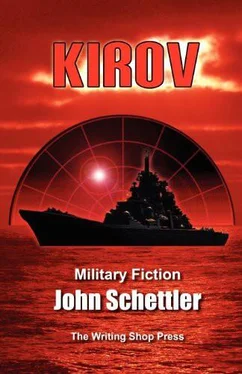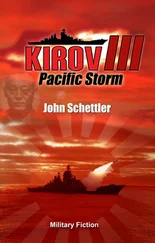John Schettler - Kirov
Здесь есть возможность читать онлайн «John Schettler - Kirov» весь текст электронной книги совершенно бесплатно (целиком полную версию без сокращений). В некоторых случаях можно слушать аудио, скачать через торрент в формате fb2 и присутствует краткое содержание. Жанр: Фантастика и фэнтези, Альтернативная история, на английском языке. Описание произведения, (предисловие) а так же отзывы посетителей доступны на портале библиотеки ЛибКат.
- Название:Kirov
- Автор:
- Жанр:
- Год:неизвестен
- ISBN:нет данных
- Рейтинг книги:5 / 5. Голосов: 1
-
Избранное:Добавить в избранное
- Отзывы:
-
Ваша оценка:
- 100
- 1
- 2
- 3
- 4
- 5
Kirov: краткое содержание, описание и аннотация
Предлагаем к чтению аннотацию, описание, краткое содержание или предисловие (зависит от того, что написал сам автор книги «Kirov»). Если вы не нашли необходимую информацию о книге — напишите в комментариях, мы постараемся отыскать её.
Kirov — читать онлайн бесплатно полную книгу (весь текст) целиком
Ниже представлен текст книги, разбитый по страницам. Система сохранения места последней прочитанной страницы, позволяет с удобством читать онлайн бесплатно книгу «Kirov», без необходимости каждый раз заново искать на чём Вы остановились. Поставьте закладку, и сможете в любой момент перейти на страницу, на которой закончили чтение.
Интервал:
Закладка:
“Don’t quibble with me, Captain. Answer my question.”
“We have used twelve Moskit-IIs and a few more S-300s.”
“Twelve? Good God. That ship must have been an inferno. Did it occur to you that we do not need to use saturation barrage tactics on these targets?”
“You misunderstand me, admiral. I used the missiles very selectively. Only three were targeted against the aircraft carrier. Three more engaged her screen, and the remainder were expended earlier, shortly after you were taken ill. With those I drove off the other British units closing on our position, including the two carriers to our north. We have not seen an enemy aircraft since, or ship, for that matter. They have learned to respect us, sir.”
“That and more,” said Volsky. He paused, fixing the Captain with heavy eyes. “Do you know what they are doing out there now, Karpov?” The Admiral pointed to a distant location outside the ship. “The British have not run home for tea. Their Prime Minister is at sea, and bound for these very waters. No, no… they are most likely marshalling every ship of war within a thousand miles of our last known heading, and the next time they appear on Rodenko’s radar screen we will have more targets than you might think. As for the Americans, they are thinking now how to turn the anger and shock of your thoughtless act into a sure and steady momentum that will bring them into this war, not with a declaration against Japan, but one against Germany. And they will be sending out the whole of their Atlantic Fleet to find the ship and crew who sunk the Wasp…to find you, Captain,” he pointed.
“And unfortunately, all of the rest of us are aboard as well, so we will have to live with the consequences of your short temper and eagerness for war. That is what we have in front of us now, Mister Karpov. It will not be a few ships here, a few ships there. They will come out to look for us in force, to hunt us down with nothing but well justified vengeance in their minds and hearts. And do you know what? I think there may even be a little contest between them to see which one finds and sinks us first.” He paused to see if that might sink into his Captain’s head, but Karpov seemed as stolid and unbending as ever.
Vengeance was something he understood all too well, and he expressed his thought. “They are not the only ones needing a little revenge, sir. Now they get a taste of it from us for a change.”
Volsky sighed. “You think these are the men responsible for our lot in life? You think they have caused our economy to collapse, our cities to stagnate and rot? They were all dead before the Iron Curtain fell and the nation that men like Stalin and Khrushchev built came down in a pile of stink. What did you hope to accomplish with this attack?”
“I was only defending the ship, sir.”
“I can see this is leading us nowhere. Defending the ship? All you have done is increase the danger that lies ahead for us. It might have been possible to reason with these men. I was steering this course to consider that possibility, but after this, I’m afraid they will not care much for a friendly chat.”
“But at least they will respect us,” said Karpov, and just a little too sharply. The Doctor noticed his tone immediately, shifting uneasily in his chair.
The Captain continued. “This brings us to a point I feel compelled to raise now, sir.” He looked at Zolkin. “But perhaps the Doctor would excuse us?”
Zolkin looked up at him, then leaned back in his chair, hands behind his head. “I think you are wanting to talk about nuclear bombs, yes? No, Captain, I will not wander off to my sick bay and rattle about with my stethoscope and thermometers. I am a Captain of the Second Rank, and third in the chain of command aboard this ship. In fact, it is mine to say whether either one of you, or any man aboard, is deemed fit for duty. So I think I will stay. If you have some idea about blowing up the world out there, I’d like to hear about it. It may help me decide whether or not you are still sane.”
Part X
“ Whether it's good or bad, it is sometimes very pleasant, too, to smash things…”
— Fyodor DostoevskyChapter 28
August 7, 1941
The Cruiser Augusta and her escorts was running at flank speed, doubling up from the sedate 15 knots she had been steaming. Behind her, falling slowly behind, was the old battleship Arkansas. Two other cruisers and the fast destroyers of Desron 7 went ahead with Augusta. The President was in a hurry, and Arkansas would have to catch up as best she could.
Messages had come in from all quarters, the British Admiralty sharing intelligence, their Home Fleet coordinating the arrival of the Prime Minister, the American Task Force 16 withdrawing slowly back to St John’s Newfoundland bearing the survivors of TF-1. Captain Jerauld Wright aboard Mississippi had to be reined in to compel him to turn about. When he saw the wreckage of the Wasp and Vincennes he wanted to immediately steam north to deal with the German raider, but cooler heads prevailed.
Admiral King had directly ordered him to withdraw, and also radioed back to the Navy base at Long Island, NY and ordered all the now orphaned strike squadrons of CV Wasp to fly out to the airfields near Ship Harbor on Newfoundland. The place was rapidly becoming one of the most active military bases on the east coast, its numerous inlets to soon become anchorages for over twenty U.S. warships, with more still coming from home ports. The British had an equal force at sea. They were all just a day away now, the battle fleets eager to deliver their high ranking civilian and military officials to the secret conference, and then get quickly out to sea to hunt down this new German threat. Planes were up from Newfoundland’s Patrol Wing 7 flying PBY Catalinas and Mariners in Squadrons 71 and 72, keeping a wary eye to the north.
Admiral Ernest King was the sixty-three year old Commander of the Atlantic Fleet. “The King” or simply “Rey” to those closest to him, was an old battleship captain, he had served through WWI and even saw action as an observer on a few Royal Navy ships at that time. The experience made him somewhat suspicious and wary of the British, who clearly considered themselves the rightful masters of the Atlantic ocean, all other vessels sailing there by their leave. Yet, as the United States emerged as a strong naval power, she was still not fully ready to project real power into the Atlantic as Britain had done for decades the world over. The new bases leased to the U.S. by England in exchange for 50 old US destroyers had helped to give the Americans a means of better projecting that power, and Argentia was one such base.
After the first great war, King floundered with assignments administering the submarine fleet, and posts involving Naval aviation, receiving his qualifying wings in 1927. By June of 1930 he found himself assigned as Captain of “Lady Lex,” the aircraft carrier Lexington. He remained an opinionated man, somewhat surly and prone to anger, and his acerbic jousting with other hatbands saw him disliked by many of his colleagues, and had almost landed him in a graveyard post with the Navy’s General Board, a grey priesthood of aging officers who would sit around discussing policy and ship programs. One of the few allies he had in the service, Admiral Harold Stark, Chief of Naval Operations, thought he could serve better as the Commander of the Atlantic Fleet, and he appointed, some say “anointed,” King as such in late 1940.
Roosevelt once described King as “a man who shaved every morning with a blow torch,” his disposition and demeanor being so fiery and easily riled. Like the Army’s General Patton, the Admiral was of the opinion that when trouble came around “they send for the sons-of bitches,” as he put it indelicately. He was one of them. His first reaction to the news that Wasp had been sunk was to send Captain Wright on the Mississippi out to find the Germans and rip their heads off. It was his old friend and still senior Admiral Starke who had advised him to be cautious.
Читать дальшеИнтервал:
Закладка:
Похожие книги на «Kirov»
Представляем Вашему вниманию похожие книги на «Kirov» списком для выбора. Мы отобрали схожую по названию и смыслу литературу в надежде предоставить читателям больше вариантов отыскать новые, интересные, ещё непрочитанные произведения.
Обсуждение, отзывы о книге «Kirov» и просто собственные мнения читателей. Оставьте ваши комментарии, напишите, что Вы думаете о произведении, его смысле или главных героях. Укажите что конкретно понравилось, а что нет, и почему Вы так считаете.












